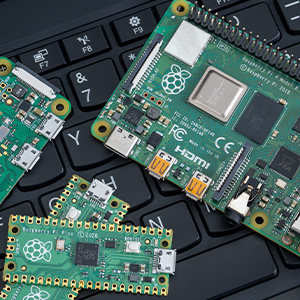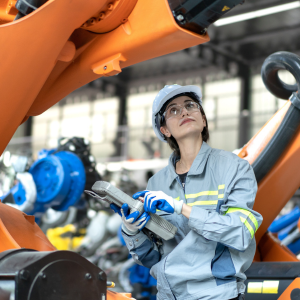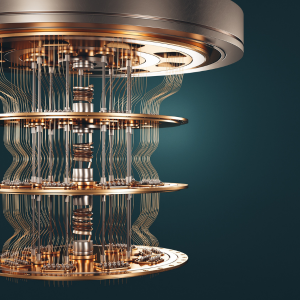Smart Connectors & Industry 4.0
Post By: Ryan King On: 26-09-2019 - Automation & Control - Industry 4.0 - Industry Trends
First we had the internet, then the Internet of Things (IoT) and now such a rapid growth of industrial technology that we are already well into the IIoT (Industrial IoT). Industry 4.0 is the Fourth Industrial Revolution, and its impact is increasing exponentially as continuous innovation enhances efficiency, speed and cost-effective manufacturing. Unlimited quantities of new applications are being invented and introduced every day, with sensors of all types forming an essential part of automated industrial systems. One thing they all require is to be joined together, and that's where Smart Connectors come in.
What Are Smart Connectors?
In order to take advantage of the IIoT, system networks must be able to share and communicate the vast amounts of collected data that is generated by the various system sensors. This is necessary to govern automated control functions, calibrate and regulate equipment such as motors, and enable advance planning functions and predictive maintenance.
Proximity, flow and motion sensors, optical and environmental sensors, and many more types of input, generate a huge data stream. It all has to be integrated into a logic controller of some sort, at very high data transfer rates – and all happening at the same time. Smart connections must be made between the different nodes or elements of a factory production line, between one manufacturing line and another in the plant, and between the whole plant and the rest of the business enterprise. They need to support high speed communications and signal integrity, often when situated in harsh environments and over a long life cycle.
Why Use Smart Connectors?
A recent performance enhancement in the IIOT is known as sensor fusion, which incorporates advanced software and processing in smart connectors, in order to integrate all the different kinds of sensory input into the entire automated system. Smart connectors have additional intelligent functionality that can be used in many different types of application, such as surge protection, energy measurement and machinery identification. Independently mounted modules can be plugged into an automated system with push-in spring terminal connections, such as those offered in the Harting Han-Smart® collection supplied by Rowse Automation, which can expand networks with new devices, identify and incorporate enhanced applications, and manage and store big machine data.
Several industrial protocols are currently competing to meet the transmission requirements of such smart connectors, including industrial-level ethernet protocols and the existing traditional connectors, such as Modbus and Profibus. Speed and connectivity are the primary considerations, especially for large installations, with smart connectors in fully automated factories having to transport data at speeds varying from 1Gb/s to 10Gb/s. These large capacities can presently only be maintained over shorter distances, but are essential for the communication of high-definition video, for example, or real-time data analytics for making instant system adjustments.
Choosing The Right Connector
To meet the demands of the smart factory, manufacturers of smart connectors are producing cable assemblies, standard interface connectors and integrated modules with a wide range of options for mating, mounting and shielding. They can also combine power and data connections within the module housing, which saves on space without any compromise on performance.
Power efficiency and space are critical concerns to design engineers, especially when choosing a system that relays data from a factory element or node to a processor, and then returns instructions to the node or to an actuator. Factories are inordinately demanding environments, where any combination of extreme temperatures, constant vibration and corrosive elements may be expected, none of which are beneficial to sensitive electronic equipment. The most reliable connection in such a harsh environment is a wired connector which must meet the standard IP67 or IP68 ratings.
IP Ratings (standing for Ingress Protection or sometimes International Protection, and not to be confused with Internet Protocol) is a system of classification demonstrating degrees of protection for connection devices in relation to liquids and solid objects. IP67 and IP68 are the two principal classifications used for waterproof connectors, with IP67 being the most popular general purpose waterproof connector and IP68 the heavier duty version. IP67 connectors are high quality, waterproof grade connectors which can provide long-term durability in harsh or extreme climatic conditions, including dust and immersion in 15cm to 1m of water for up to 30 minutes.
The other IP, Internet Protocol, is also rated for data transmission speeds and security between factory nodes, with industrial IP addresses being substantially lengthened to provide for the immense growth in network addresses required by Industry 4.0.
Conclusion
As Industry 4.0 continues to advance; as smart applications in the factory environment develop daily, and the various competing protocols fight it out for market dominance, choosing the right smart connector is not going to be easy. The entire system must be taken into account, from the types of industrial sensor involved in the system to the processing demands and choice of cloud hosting, not to mention overall performance. It is therefore advisable to consult with technical experts. Our team at Rowse Automation can offer many years of expertise in the electrical and automation industry. We can pass on our knowledge of the processing functions that will be required, together with an in-depth understanding of the types and design of sensors that will contribute to the system. We can also make some recommendations on the wide array of smart connectors available.
Our team comprises technical account managers and engineers who are able to offer advice in a knowledgeable yet unbiased manner. Our practical design experience spans many years in the field, where we have been able to build deep and lasting manufacturer relationships. This expertise is beneficial to any design engineer or system developer who may be trying to navigate the complex maze of available options, and to comply with the most up-to-date standards.
Industry 4.0 is a new world that combines software development, high-level sensor technology, and smart connectivity with advanced data processing and cloud-hosted computing. All these aspects together offer a future-proof, full system solution to any industrial application – and smart connectors form an integral part of making it all work smoothly.
Get More From Rowse Straight To Your Inbox




